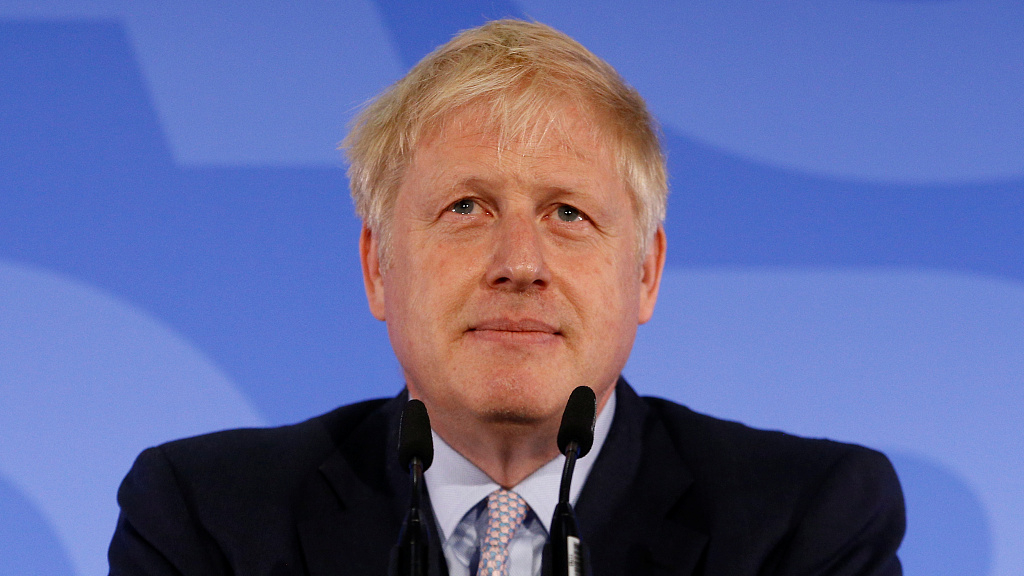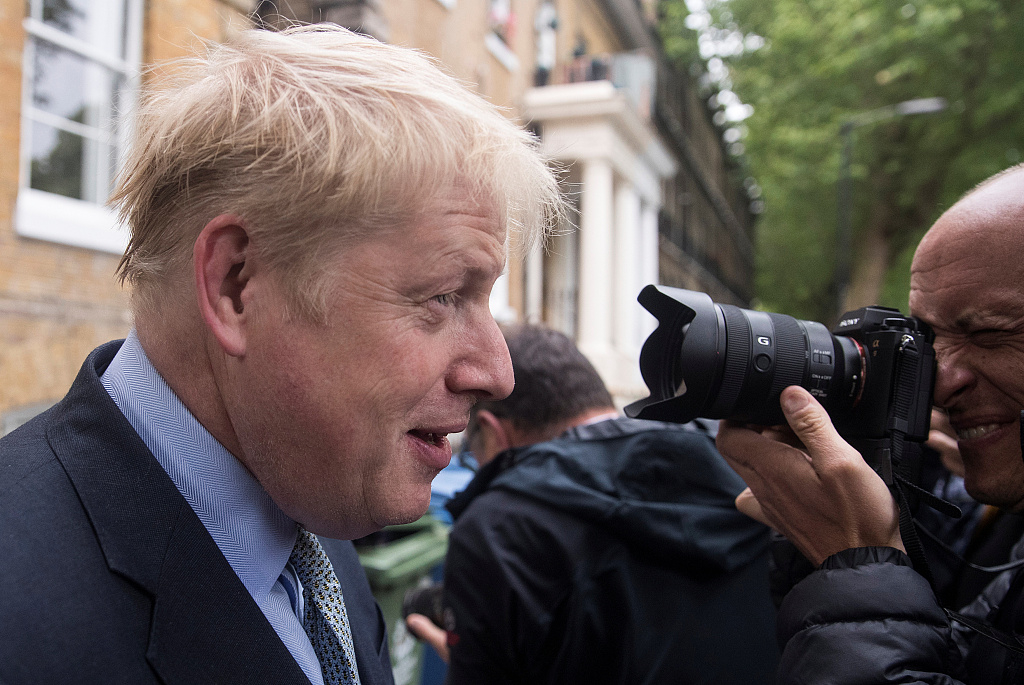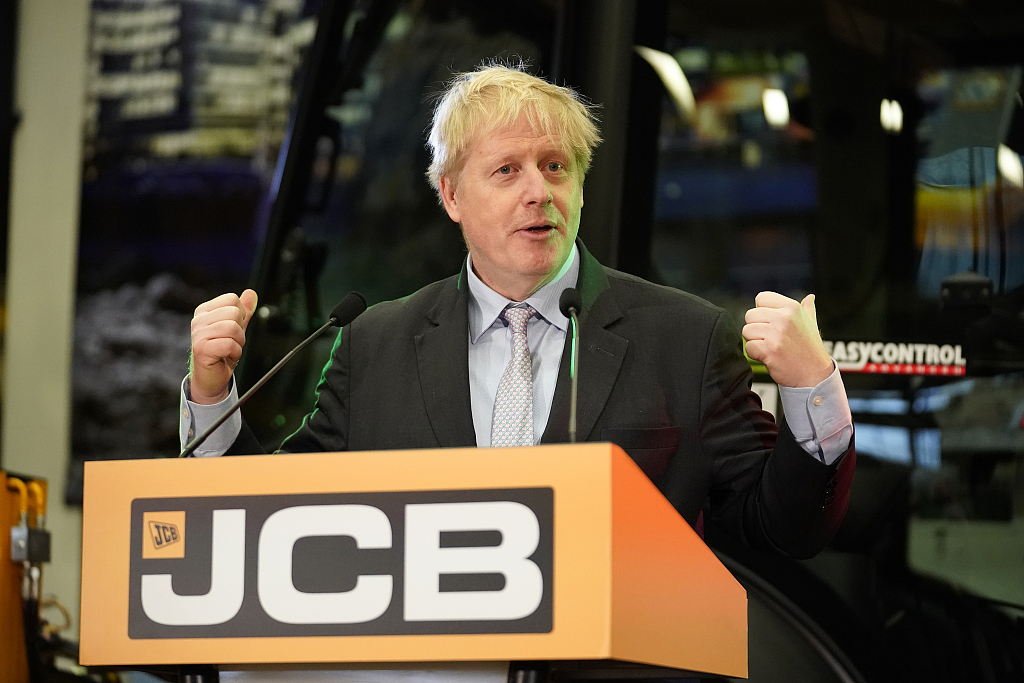

Editor's Note: Chris Deacon is a postgraduate researcher in politics and international relations at the University of London and previously worked as an international commercial lawyer. The article reflects the author's opinion, and not necessarily the views of CGTN.
The first round of voting in the contest to become the next leader of the UK's governing Conservative Party – and, therefore, Prime Minister – took place on Thursday afternoon in Parliament. Boris Johnson won by far the most votes, so is he now unstoppable or can another candidate still challenge him?
The Conservative Party's voting process to decide its next leader has multiple rounds, which will entail the party's Members of Parliament voting until all but two candidates have been eliminated. These final two will then face a vote of the rank-and-file members of the party to decide the winner.
In Thursday's vote, the requirement to proceed to the next round was receiving at least 17 votes (including the candidate voting for themselves). Three candidates – Mark Harper, Andrea Leadsom and Esther McVey – did not reach this bar and so have been eliminated from the contest. The remaining candidates will now be trying to pick up these votes for the next round.

Conservative Party leadership candidate Boris Johnson leaves his home in London, UK, June 13, 2019. /VCG Photo
Topping the contest by some distance was Boris Johnson – the bookmakers' clear favorite to win – with 114 votes. The next best was Foreign Secretary Jeremy Hunt with 43, followed by Michael Gove with 37. One candidate who many assumed would be eliminated at this first stage was Rory Stewart – but, in fact, he just scraped through with 19 votes, as his popularity among the public continues to soar.
If Boris Johnson can maintain this level of support among fellow Conservative MPs, he is guaranteed a spot in the final two. He is also currently the leading favorite in polling of party members – and has been for some time. While this might suggest his victory is assured, the race is not over yet.
There are still at least two more rounds of voting among MPs to come – and possibly more. While it is possible that candidates receiving fewer votes will choose to drop out, they have been urged not to by the party as the last leadership election – won by Theresa May – never reached a members’ vote. The party wants to avoid such a scenario this time to try to galvanize the engagement of members with the party.
This means there is still plenty of time for things to change and, indeed, many opportunities for the triggering of this change. In particular, for the first time televised debates between the candidates have been planned. Such discussions are a significant opportunity for lesser-known candidates to communicate their message and increase their popularity. Although only MPs will be voting at this stage, it would be challenging to ignore widespread public popularity for a candidate.

Boris Johnson delivers a speech at the JCB World Headquarters in Rocester, Staffordshire, UK, January 18, 2019. /VCG Photo
The first of these debates is scheduled to occur this weekend on the UK's Channel 4. This debate is particularly important because it will include all of the seven candidates still in contention, as opposed to the others which will likely only take place after further eliminations and, possibly, only between the final two.
Or, this is Channel 4's plan at least. Boris Johnson is causing trouble for them by suggesting he will shun their debate. This is the tried and tested tactic of the political favorite – he can likely only be damaged at such a debate, as the others try to gang up on him – so it is unsurprising that he wants to wait until later in the contest. But he could well still be attacked in his absence and will not be there to defend himself, so may yet not escape with his popularity unharmed.
These debates, especially at the final two stage, could also change support levels among party members. It is very common in Conservative leadership elections for the initial favorite not to go on and win. When David Cameron stood against David Davies, for example, he was initially far behind in the polling before eventually winning. There is still time for Johnson to suffer the same fate.
So while his path to victory may currently seem secure, there is still a long way to go for Boris. To rule out the possibility of another candidate besting him would be foolish and show a lack of understanding of the Conservative Party's history and the nature of the electorate in this contest. Dark horses still lurk in wait to seize power if their popularity can grow enough. There is still time for a surprise.
(If you want to contribute and have specific expertise, please contact us at opinions@cgtn.com.)

Copyright © 2018 CGTN. Beijing ICP prepared NO.16065310-3
Copyright © 2018 CGTN. Beijing ICP prepared NO.16065310-3